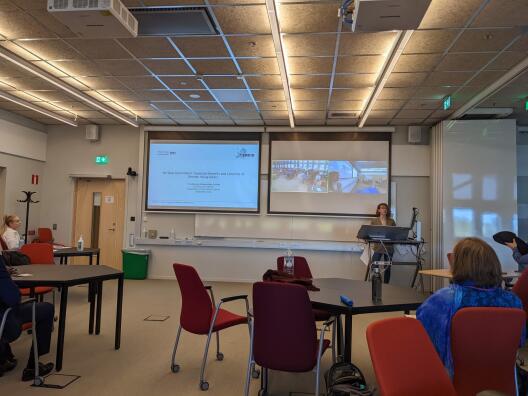Konferenzteilnahme EGOV-CeDEM-ePart 2022, Linköping
Antragsteller: Irisa Murataj
Fachbereich, Studienrichtung: FB 04, Master Information Systems
Last winter semester I attended EUROPEAN DIGITAL DECADE conventional seminar as part of my master’s program (Information Systems). The main goal was to learn about digital government and digital transformation in Europe as well as to prepare a publishable article for the EGOV-CeDEM-ePart conference taking place in Linköping/Sweden (September 2022). I chose this seminar based on the key topics it covered since I want to do a more in-depth amount of research for my master's thesis. Working on regular basis to get accepted to the conference made the research more challenging but also helpful in professional growth. Keynote talks and scientific studies were presented at the multi-day conference, along with other engaging topics for discussion. Nicely integrated keynote speeches envisioned my future goal on what and how to work. During the other scholars’ presentation, it was a great benefit to ask questions in person regarding their working and the methodologies they applied to have a decent research. As far as I remember, I had to request access to one article when writing this paper and going to the conference afforded me the opportunity to speak with the author in person. Furthermore, he was convincing and supporting me to keep researching on e-Government as it is crucial for future policy making in this regard. Several tracks were part of the conference, analyzing e-Government from diverse viewpoints. The attendance demographics were also amazing gathering people from all over the World in a big community sharing the same interests. That helped me grow my professional network and be more familiar with the benefits and challenges of e-Government implementations worldwide. Being a master's student amid numerous PHD students, professors, and other academics was unique for me, among other things. Although at first it appeared that I had the least experience, it was simple to integrate in discussion and direct questions. Moreover, having to present my work, taught me how to summarize essential point of a research to others. It was challenging as everyone had deep knowledge on the topic and I had a great responsibility on what I was presenting. In additional to that, the feedback and questions received were quite professional based on their background. In addition to that, everyone was sharing their journey in the academic’s world making is easier to understand and to properly handle the challenges alongside the main goal of writing articles. In conclusion, I can say that going to this conference has helped me in many ways and increased my confidence in doing and presenting possible research to others. In order to publish my final article at a different conference, I am therefore enrolled in another seminar during the winter semester WiSe22/23.
Introduction
EGOV-CeDEM-ePart 2022 Conference on e-Government was held at the University of Linköping, in Linköping, Sweden on 6-8 September 2022. Around 100 participations attended the conference. Among all the authors and organizers there were also other interested parties like doctoral students, professors and other academics etc. The main theme of the conference was e-Government.
Another fact was the high number of papers submitted from Germany, 17.5 in total as demonstrated during the presentation of some statistics. Moreover, 4 of the papers that were approved were the outcome of research done at our university, University of Münster.
Proceeding Session
Dr. Ida Lindgren was the chair for most of the sessions. On the first day, the conference chairs presented some statistics about the conference in general and they introduced three main keynote speakers (“Beyond the Box Reflections on Blue Sky Thinking” by Frank Bannister, Trinity College; “From Feared Tax Collector to Popular Service Agency” by Anders Stridh, Swedish Tax agency; “Trustworthy AI – The European Approach” by Fredrik Heintz, Linköping University). Moreover, a short introduction of the program was released. There were 26 sessions in total lasting for 90 minutes each taking place throughout the three days. They were 3 sessions happening in parallel in the main building of the University, Valla campus – Studenthuset. Since some participants could not join in person due to pandemic restrictions, the conference was also offered in a hybrid mode. During the paper sessions, each speaker had approx. 25 minutes to present and receive feedback on their paper. There were two roles present in each session to support the speakers and ensure a good conference experience for everyone;
- A session chair – a person from the conference organization (typically track chairs), responsible for introducing the speakers, time keeping, and moderating the discussions. The responsible session chair is underlined in the programme above.
- A session assistant – a person from Linköping University, responsible for the technical equipment and surveilling the Zoom room.
A few of the main sessions to be mentioned:
1. Opportunities and challenges and benefits
2. Data sharing and digitalization
3. e-Democracy & e-Participation Emerging Issues and Innovations
4. Worldwide E-governments
5. ICT and Sustainability Development Goals
6. Emerging Issues and Innovations
7. Legal Informatics
8. Digital Transformation
9. E-democracy and voting (online presentations only)
Moreover, on the second day, three papers won the best paper award in these three main categories:
Category 1 – The most innovative research contribution or case study. Awards the paper with the most out-of‐the‐box and forward-looking idea and concept. Relevance is more important than rigor.
Category 2 – The most compelling, critical research reflection. Awards the paper with the most compelling critical reflection on and discussion of a relevant research topic.
Category 3 – The most promising practical concept. Awards the paper delivering a concept or solution with the highest potential to have a high impact in e-government implementations and applications.
Conclusion
Concluding statement made by Mr. Ulf Melin, he thanked everyone present and those who contributed to the success of the conference, and then officially declared the conference closed but there was one last social event offered to the participants, visiting the old Linköping.


